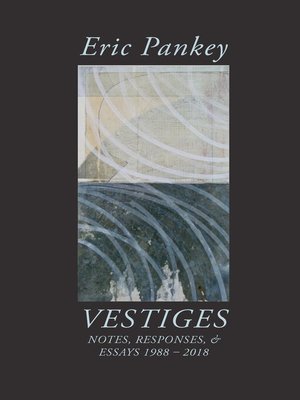Vestiges
ebook ∣ Notes, Responses, & Essays 1988–2018 · Illuminations: a Series on American Poetics
By Eric Pankey

Sign up to save your library
With an OverDrive account, you can save your favorite libraries for at-a-glance information about availability. Find out more about OverDrive accounts.
Find this title in Libby, the library reading app by OverDrive.



Search for a digital library with this title
Title found at these libraries:
| Library Name | Distance |
|---|---|
| Loading... |
"If only words were salt—soluble, savory, vital, electric," Eric Pankey writes in "Variations on Hadrian's Animula," one of many virtuosic works in Vestiges: Notes, Responses, and Essays 1988 – 2018. In this diverse collection of lyrical prose, Pankey assays his personal-poetic history with passion, brilliance, and grace. He considers the works of many great poets—Dickinson, Stevens, Donne, Hopkins, Merwin, Justice, Levis, and Lorca, to name just a few—invoking them as teachers and guides. As much about language as the unutterable, sight as the unseen, Vestiges is a gorgeous, vital collection.
—Danielle Cadena Deulen, author of The Riots Vestiges: Notes, Responses, and Essays 1988 – 2018 maps the mind of one of our best lyrical poets and thinkers. In these concise and nuanced works of prose, Eric Pankey meditates on such subjects as spiritual faith, the poetic image, memory, language, duende, and silence in poetry. Pankey is a quester, a searcher for truth, so it's no surprise that in Vestiges he eschews nailed-down arguments and grand arrivals, prioritizing the question and the journey towards "the unsayable, the untouchable . . . the unknowable." He reminds us that mystery and uncertainty are not weaknesses, but essential aspects of a life lived richly in both art and faith. —Brian Barker, author of Vanishing Acts Eric Pankey muses, "What is the divine? How is it made manifest? Where does it reside?" Revisiting the lyric impulse in a post-religious generation, Vestiges ponders the Romantic lyric subject in light of postmodern skepticism with allusions to Biblical contexts, illuminating the phenomenon of wonder in a material yet epistemologically unstable world: "In the lyric, language is both the ritual and the sacrifice at the moment's altar." Guided by an inner compass of memory and desire, psalms and lamentations, restoration and revival, we unearth in ourselves "not a spark, but a splinter of God in each of us, inflamed, working its way to the surface." This book, a revitalizing act of faith and inspiration, is a marvelous gift to us.
—Karen An-hwei Lee, author of Phyla of Joy







